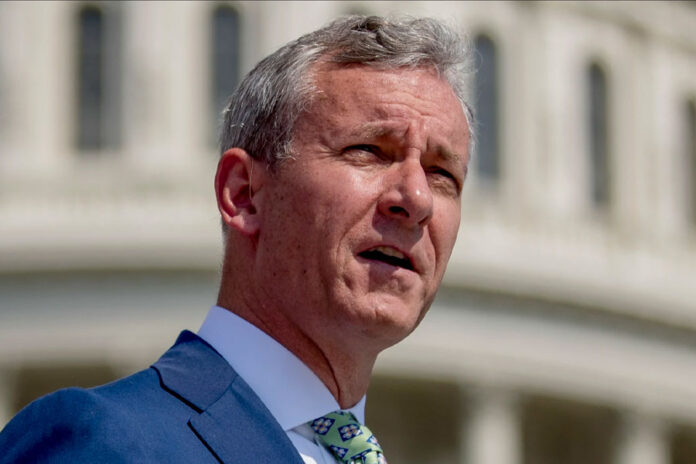
HARRISBURG, Pa. — With the U.S. House narrowly divided, contests for Pennsylvania’s seats will be critical to control of the chamber in this year’s election, even as the state also plays a big role in determining control of the White House and Senate.
The magic number of pickups is four for Democrats to take control of the House, magnifying the stakes of each House race.
In Pennsylvania, the parties began the year viewing five races as competitive, as Democrats defend their 9-8 advantage in the state’s 17-seat delegation.
Adding to the stakes is the fact that Pennsylvania is home to one of the “Biden 16” — the 16 House districts nationally that President Joe Biden won in 2020 but are represented by Republicans.
On the opposite side, Pennsylvania is also home to one of the eight districts that former President Donald Trump won but are represented by Democrats. Five of those Democrats are running for reelection.
Federal Election Commission filings show the candidates and outside groups have poured more than $60 million into the races, with the total expected to climb significantly until polls close on Nov. 5.
For Republicans, there may be room to flip districts: Two incumbent Democrats won by fewer than 2.5 percentage points in 2022.
Here is a look at the five key races:
1st District
Four-term Republican U.S. Rep. Brian Fitzpatrick in Bucks County, just north of Philadelphia, is a top target again for Democrats: He is one of the Biden 16.
But Fitzpatrick, a mild-mannered former FBI agent who took over the seat from his late brother, has a potent winning formula that includes his family’s name recognition and inroads into traditional Democratic voting districts.
He is endorsed by top-tier labor unions, as well as the AFL-CIO, and is running a digital ad calling himself the “No. 1 most bipartisan congressman.”
His opponent is Ashley Ehasz, a former Army helicopter pilot he beat in 2022 by almost 10 points.
Democrats have attacked Fitzpatrick’s vote for Trump’s tax-cutting legislation, his opposition to Trump’s impeachment and his support for a 20-week abortion ban in 2017.
Fitzpatrick is running an ad saying he backs abortion rights — specifically, Pennsylvania’s law that protects the right to an abortion until 24 weeks of gestation, the Roe v. Wade standard of viability — and cites his votes to protect access to IVF and contraception.
Fitzpatrick has more than doubled Ehasz’s fundraising and her campaign hasn’t attracted any outside groups to spend against Fitzpatrick.
7th and 8th Districts
Three-term Democratic U.S. Rep. Susan Wild and six-term Democratic U.S. Rep. Matt Cartwright are each a perennial Republican target in their eastern Pennsylvania districts and each has consistently fended off challengers, if by slim margins.
Their races are emerging as the most expensive congressional contests in the state.
Cartwright has the distinction of being one of five Democrats nationally running for reelection in a district won by Trump in 2020 — even though his 8th District seat includes Scranton, the city where Biden was born and that played prominently into Biden’s winning presidential campaign.
Wild and Cartwright represent neighboring districts with similar geographies: small cities, suburbs and stretches of rural eastern Pennsylvania that include anthracite coal country. The districts are also similar in the narrow registration that Democrats hold over Republicans.
Challenging Wild in her Allentown-area 7th District seat is state Rep. Ryan Mackenzie. Wild outraised Mackenzie almost 7-to-1 through June 30.
Challenging Cartwright is Rob Bresnahan, a first-time candidate and developer who runs a family construction company.
Cartwright outraised Bresnahan by more than 2-to-1 through June 30, with outside groups pouring more than $11 million into it, according to disclosures to the Federal Election Commission.
The Wild-Mackenzie race isn’t far behind, with outside groups spending more than $10 million on it, according to the disclosures.
10th District
The hard-right politics of six-term Republican U.S. Rep. Scott Perry have made him a perennial target for Democrats in a Republican-leaning district around the cities of Harrisburg and York, with deep-red exurbs, rolling farm country and fast-growing suburbs.
Perry was chairman of the Freedom Caucus, a hard-line faction of conservatives that exerts outsize influence on the GOP majority, and was the only lawmaker to have his cellphone seized by FBI agents investigating the web of Trump loyalists who were central to the former president’s bid to remain in power after his 2020 reelection loss.
More about Perry’s efforts to help Trump emerged since he was last reelected in 2022. Those details included Perry’s efforts to elevate Jeffrey Clark to Trump’s acting attorney general — designed to reverse the Department of Justice’s stance that it had found no evidence of widespread voting fraud that would change the election result.
Perry has not been charged with a crime.
Perry won reelection in 2022 by almost 8 points against a relatively weak opponent. This time around he’s facing Janelle Stelson, a longtime local TV news anchor who is a household name.
Stelson has her own baggage: She’s a Republican-turned-Democrat who doesn’t live in the district. Still, she has relentlessly attacked Perry over his opposition to abortion rights and his role in trying to overturn the 2020 presidential election.
17th District
Democratic U.S. Rep. Chris Deluzio is being challenged in his western Pennsylvania district by state Rep. Rob Mercuri in a race that hasn’t made as much noise as the others.
Deluzio, a freshman, outraised Mercuri by nearly 3-to-1 through June 30 and the race has attracted little interest from outside groups.
Registered Democrats outnumber Republicans by a 4-3 ratio in the district, which encompasses Pittsburgh’s western suburbs and one-time steel towns along the Ohio River in Allegheny County up through Beaver County.






